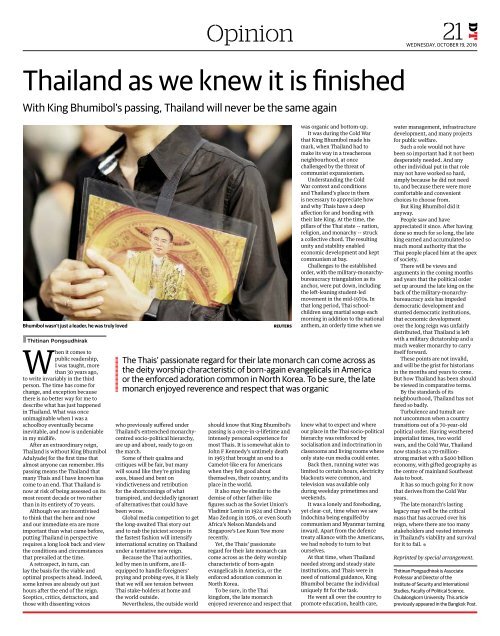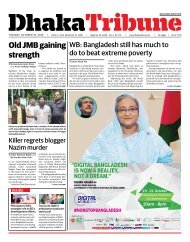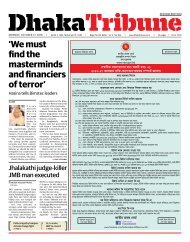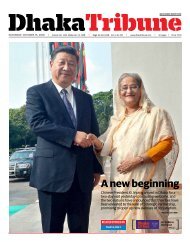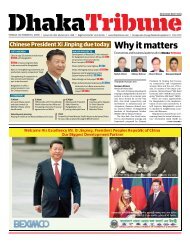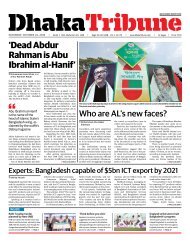ePaper_2nd Edition_October 19, 2016
Create successful ePaper yourself
Turn your PDF publications into a flip-book with our unique Google optimized e-Paper software.
Opinion 21<br />
Thailand as we knew it is finished<br />
With King Bhumibol’s passing, Thailand will never be the same again<br />
DT<br />
WEDNESDAY, OCTOBER <strong>19</strong>, <strong>2016</strong><br />
Bhumibol wasn’t just a leader, he was truly loved<br />
• Thitinan Pongsudhirak<br />
When it comes to<br />
public readership,<br />
I was taught, more<br />
than 30 years ago,<br />
to write invariably in the third<br />
person. The time has come for<br />
change, and exception because<br />
there is no better way for me to<br />
describe what has just happened<br />
in Thailand. What was once<br />
unimaginable when I was a<br />
schoolboy eventually became<br />
inevitable, and now is undeniable<br />
in my midlife.<br />
After an extraordinary reign,<br />
Thailand is without King Bhumibol<br />
Adulyadej for the first time that<br />
almost anyone can remember. His<br />
passing means the Thailand that<br />
many Thais and I have known has<br />
come to an end. That Thailand is<br />
now at risk of being assessed on its<br />
most recent decade or two rather<br />
than in its entirety of 70 years.<br />
Although we are incentivised<br />
to think that the here and now<br />
and our immediate era are more<br />
important than what came before,<br />
putting Thailand in perspective<br />
requires a long look back and view<br />
the conditions and circumstances<br />
that prevailed at the time.<br />
A retrospect, in turn, can<br />
lay the basis for the viable and<br />
optimal prospects ahead. Indeed,<br />
some knives are already out just<br />
hours after the end of the reign.<br />
Sceptics, critics, detractors, and<br />
those with dissenting voices<br />
who previously suffered under<br />
Thailand’s entrenched monarchycentred<br />
socio-political hierarchy,<br />
are up and about, ready to go on<br />
the march.<br />
Some of their qualms and<br />
critiques will be fair, but many<br />
will sound like they’re grinding<br />
axes, biased and bent on<br />
vindictiveness and retribution<br />
for the shortcomings of what<br />
transpired, and decidedly ignorant<br />
of alternatives that could have<br />
been worse.<br />
Global media competition to get<br />
the long-awaited Thai story out<br />
and to nab the juiciest scoops in<br />
the fastest fashion will intensify<br />
international scrutiny on Thailand<br />
under a tentative new reign.<br />
Because the Thai authorities,<br />
led by men in uniform, are illequipped<br />
to handle foreigners’<br />
prying and probing eyes, it is likely<br />
that we will see tension between<br />
Thai stake-holders at home and<br />
the world outside.<br />
Nevertheless, the outside world<br />
REUTERS<br />
should know that King Bhumibol’s<br />
passing is a once-in-a-lifetime and<br />
intensely personal experience for<br />
most Thais. It is somewhat akin to<br />
John F Kennedy’s untimely death<br />
in <strong>19</strong>63 that brought an end to a<br />
Camelot-like era for Americans<br />
when they felt good about<br />
themselves, their country, and its<br />
place in the world.<br />
It also may be similar to the<br />
demise of other father-like<br />
figures such as the Soviet Union’s<br />
Vladimir Lenin in <strong>19</strong>24 and China’s<br />
Mao Zedong in <strong>19</strong>76, or even South<br />
Africa’s Nelson Mandela and<br />
Singapore’s Lee Kuan Yew more<br />
recently.<br />
Yet, the Thais’ passionate<br />
regard for their late monarch can<br />
come across as the deity worship<br />
characteristic of born-again<br />
evangelicals in America, or the<br />
enforced adoration common in<br />
North Korea.<br />
To be sure, in the Thai<br />
kingdom, the late monarch<br />
enjoyed reverence and respect that<br />
was organic and bottom-up.<br />
It was during the Cold War<br />
that King Bhumibol made his<br />
mark, when Thailand had to<br />
make its way in a treacherous<br />
neighbourhood, at once<br />
challenged by the threat of<br />
communist expansionism.<br />
Understanding the Cold<br />
War context and conditions<br />
and Thailand’s place in them<br />
is necessary to appreciate how<br />
and why Thais have a deep<br />
affection for and bonding with<br />
their late King. At the time, the<br />
pillars of the Thai state -- nation,<br />
religion, and monarchy -- struck<br />
a collective chord. The resulting<br />
unity and stability enabled<br />
economic development and kept<br />
communism at bay.<br />
Challenges to the established<br />
order, with the military-monarchybureaucracy<br />
triangulation as its<br />
anchor, were put down, including<br />
the left-leaning student-led<br />
movement in the mid-<strong>19</strong>70s. In<br />
that long period, Thai schoolchildren<br />
sang martial songs each<br />
morning in addition to the national<br />
anthem, an orderly time when we<br />
The Thais’ passionate regard for their late monarch can come across as<br />
the deity worship characteristic of born-again evangelicals in America<br />
or the enforced adoration common in North Korea. To be sure, the late<br />
monarch enjoyed reverence and respect that was organic<br />
knew what to expect and where<br />
our place in the Thai socio-political<br />
hierarchy was reinforced by<br />
socialisation and indoctrination in<br />
classrooms and living rooms where<br />
only state-run media could enter.<br />
Back then, running water was<br />
limited to certain hours, electricity<br />
blackouts were common, and<br />
television was available only<br />
during weekday primetimes and<br />
weekends.<br />
It was a lonely and foreboding,<br />
yet clear-cut, time when we saw<br />
Indochina being engulfed by<br />
communism and Myanmar turning<br />
inward. Apart from the defence<br />
treaty alliance with the Americans,<br />
we had nobody to turn to but<br />
ourselves.<br />
At that time, when Thailand<br />
needed strong and steady state<br />
institutions, and Thais were in<br />
need of national guidance, King<br />
Bhumibol became the individual<br />
uniquely fit for the task.<br />
He went all over the country to<br />
promote education, health care,<br />
water management, infrastructure<br />
development, and many projects<br />
for public welfare.<br />
Such a role would not have<br />
been so important had it not been<br />
desperately needed. And any<br />
other individual put in that role<br />
may not have worked so hard,<br />
simply because he did not need<br />
to, and because there were more<br />
comfortable and convenient<br />
choices to choose from.<br />
But King Bhumibol did it<br />
anyway.<br />
People saw and have<br />
appreciated it since. After having<br />
done so much for so long, the late<br />
king earned and accumulated so<br />
much moral authority that the<br />
Thai people placed him at the apex<br />
of society.<br />
There will be views and<br />
arguments in the coming months<br />
and years that the political order<br />
set up around the late king on the<br />
back of the military-monarchybureaucracy<br />
axis has impeded<br />
democratic development and<br />
stunted democratic institutions,<br />
that economic development<br />
over the long reign was unfairly<br />
distributed, that Thailand is left<br />
with a military dictatorship and a<br />
much weaker monarchy to carry<br />
itself forward.<br />
These points are not invalid,<br />
and will be the grist for historians<br />
in the months and years to come.<br />
But how Thailand has been should<br />
be viewed in comparative terms.<br />
By the standards of its<br />
neighbourhood, Thailand has not<br />
fared so badly.<br />
Turbulence and tumult are<br />
not uncommon when a country<br />
transitions out of a 70-year-old<br />
political order. Having weathered<br />
imperialist times, two world<br />
wars, and the Cold War, Thailand<br />
now stands as a 70-millionstrong<br />
market with a $400 billion<br />
economy, with gifted geography as<br />
the centre of mainland Southeast<br />
Asia to boot.<br />
It has so much going for it now<br />
that derives from the Cold War<br />
years.<br />
The late monarch’s lasting<br />
legacy may well be the critical<br />
mass that has accrued over his<br />
reign, where there are too many<br />
stakeholders and vested interests<br />
in Thailand’s viability and survival<br />
for it to fail. •<br />
Reprinted by special arrangement.<br />
Thitinan Pongsudhirak is Associate<br />
Professor and Director of the<br />
Institute of Security and International<br />
Studies, Faculty of Political Science,<br />
Chulalongkorn University. This article<br />
previously appeared in the Bangkok Post.


